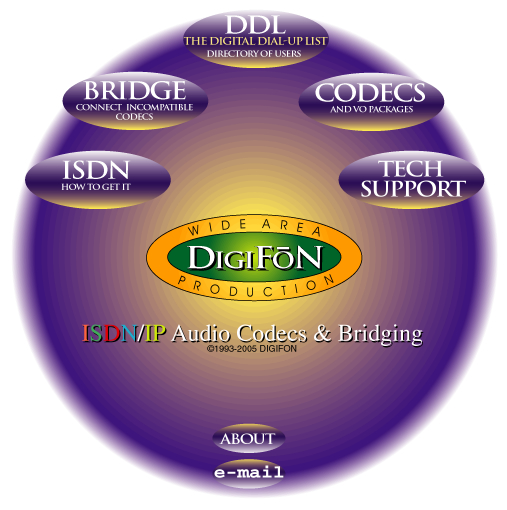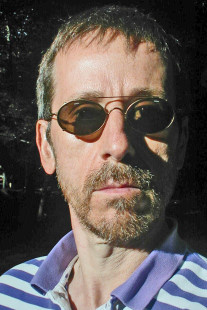  Following decades in the music and advertising recording biz, Dave Immer founded Digifon to serve people using ISDN for live, high-quality audio transmissions by phone lines. His home page, above, includes a link to a directory of ISDN codec users.
ISDN Q&A: DigiFon's Dave Immer -
Codecs, Telcos & How They Work
By Dave Courvoisier
Voice Actor & TV News Anchor
 Dave Immer of Digifon is one of a handful of North Americans who knows ISDN up and down, North and South, in and out - and still keeps his sanity. Dave Immer of Digifon is one of a handful of North Americans who knows ISDN up and down, North and South, in and out - and still keeps his sanity. He's held my hand through many a frustrating moment in the installation of ISDN in my studio, and always seems to have the right answer with a calm demeanor. Founded by Dave after a three-decade career in music and advertising recording, Digifon is a company specializing in systems that allow professional-quality audio to be transmitted and received via ISDN (Integrated Services Digital Network) telephone lines. The Digifon web site also hosts a worldwide directory of ISDN Codec users.
I asked Dave if he'd be willing to offer his advice on some of the most common questions concerning ISDN - a sort of ISDN FAQ if you will - and he graciously agreed. The resulting Q&A below is well worth your time, whether you have considered, are considering, or might consider acquiring ISDN technology in your studio.
BTW, you can reach Dave seemingly anytime at 203-254-0869. He DOES have a minimal time-based charge for support. Dave, why is ISDN so obscure in North America, and widely accepted in Europe? Europe, especially Germany, was first out of the gate with ISDN. In Germany, ISDN is what you get when you order a telephone line. In France, the telco actively promoted digital feature-rich telephones.
The vast U.S. telephone network really didn't present a good business model opportunity due to line-quality limitations. Also, broadband IP came along and blew ISDN out of the water with regard to average data speed.
While ISDN is perfectly suited to live-audio applications, other non time-sensitive forms of data-delivery benefit more from the much faster, albeit bursty, speeds of broadband IP.
Are most of the ISDN equipment manufacturers based in Europe? Taking into account all ISDN applications, probably. But the two most popular audio codec brands, Musicam and Telos, are U.S. companies. APT is Irish and Mayah is German. What portion of your clients are individuals? Professional studios? Other companies? Our bridge clients tend to be pro studios and production facilities since it is typically the producer that books bridging services. However, we have probably sold more codec systems to voice-over artists. You offer a wide array of hardware solutions on your Digifon.com web site. Do you have a favorite for reliability? Ease-of-use? Customer support? Durability? In all those categories I would choose the Musicam line of audio codecs. What is the minimum set of specifications you recommend for someone purchasing a codec (hardware)? An ISDN audio codec should be compatible with MPEG layer II (L2MONO128) since that has emerged as the street standard among voice-over producers and artists. For other applications, such as music or ADR, a high-end APT-X system would be best.
With the codecs, does spending more money equal buying a better product? In other words, do you get what you pay for, or are you buying a “name” in some instances? Generally speaking, yes, more money usually gets you more functionality, better quality. In your experience, what is the greatest challenge for the individual voice-actor in acquiring and installing ISDN in a home-private studio? Finding or creating the space in which to work and dealing with the acoustics is the greatest challenge. Setting up and learning how to use the equipment is relatively easy. Why are North American telephone companies seemingly difficult to work with for the uninitiated individual who is trying to install and configure ISDN? Live broadcast audio is one of the few applications for which ISDN is perfectly suited. As a result, it doesn't generate much profit for the telcos and so they don't allocate many resources to personnel and training. Which, in turn, makes it difficult to identify and locate helpful, knowledgeable individuals at the telcos because there are so few.
Which telephone company carrier do you perceive has the best plan for installing ISDN? For customer service with ISDN? For long distance ISDN service? For long distance ISDN costs? It depends on which area has the biggest concentration of users, these being California, New York and Illinois. Providers in those states generally offer the best pricing for the local loop.
For long distance, either Sprint or MCI provide the most reliable and inexpensive service.
Should an ISDN subscriber expect to pay a monthly or per-call fee for outgoing ISDN calls? Expect to pay both a monthly access fee and per-minute outgoing charges, just like a standard land line. Are there geographic - for instance, urban vs. rural - differences in installation and monthly ISDN service fees? If so, why? Each telco has filed tariffs with the state(s) outlining service plans and charges. It varies widely from area to area and will often be more expensive in rural locations than urban. ISDN has a circuit distance limitation of about three miles, beyond which "repeaters" are required. This adds expense to the deployment and gets passed on the the customer.
Is AudioTX a viable alternative to hardware codecs? Yes. But bear in mind that it will be affected by the stability of the PC it is running on. How does AudioTX achieve par with codecs? Is something sacrificed? As long as you have a good quality sound card, your results should be similar. What’s the biggest trade-off in choosing the more affordable AudioTX, over a popular codec like, say, the Telos Zephyr? A PC-based software codec like AudioTX is subject to instability such as software conflicts, general PC health and system overhead, unlike a dedicated hardware codec. What specific components are needed to complete the AudioTX hardware configuration? You need the AudioTX software and license, a good sound card, an ISDN terminal adapter and an NT-1 network terminator. Do you see a day when voice-over broadband IP solutions are as reliable as the copper-wire ISDN of today? That day is here, providing you use the latest hardware models from Musicam - the Suprima and RoadWarrior. These boxes enable the user to make fine adjustments in the bit-stream behaviors to optimize the reliability and delay resulting in ISDN-like performance.
Thank you! Note: For more about ISDN, also see Dave Courvoisier's feature, ISDN: Still 'The' Big League Standard.
Dave Courvoisier (“pronounced just like the fine cognac, only no relation”) is an Emmy Award-winning broadcaster, writer, producer, voice actor, and the main weeknight news anchor on KLAS-TV, Channel 8, the Las Vegas CBS affiliate. He also writes “Voice-Acting in Vegas,” a daily blog of adventures and observations in a style that’s true to his friendly Midwestern farm roots.
Email: CourVO@CourVO.com Web: http://www.courvo.com/ Blog: http://www.courvo.biz/ TV bio: KLAS-TV bio link |
|
|
Tell Us What YOU Think!
Please Note: Since we check for spam, there will be a slight delay in the actual posting of your comment.
Comments
No comments have been posted yet. Hurry, and you could be the first!




.png)

.gif)


click for new article alerts